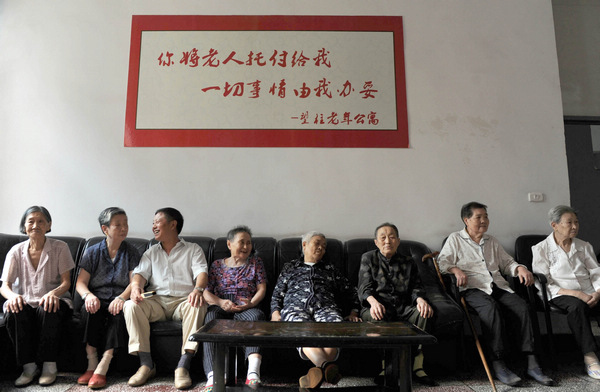 |
|
|
|
|||||||||||
Officials are calling for measures to cope with the rapid growth of the country's elderly population.
By the end of 2011, the number of Chinese who were 60 or older had hit 185 million, and that group made up about 13.7 percent of the population.
Just a year before, the number had been 177.6 million, according to a report released by the China National Committee on Ageing on March 1.
|
 |
|
Elderly people chat and rest at Wangzhu Nursing Home in Wanzhou district, Chongqing, last September. [Chen Cheng / Xinhua] |
And the increases are only expected to come more rapidly in the future.
Officials say the number of people who are 60 or older will exceed 200 million by next year and reach 400 million by 2033. According to predictions, every year from 2014 to 2033 will see the addition of 10 million elderly people on average.
By the end of 2015, China will be home to 24 million people who are 80 or older. They will make up 11.1 percent of the population. Meanwhile, more than 51 million people who are 65 or older will be "empty nesters", or parents whose children have moved out, according to Minister of Civil Affairs Li Liguo.
Chen Chuanshu, executive deputy director of the China National Committee on Ageing, said the aging issues deserve attention, especially since they are likely to be of great consequence for social and economic development.
He said departments that deal with aging issues should prepare to cope with the difficulties that can arise from having a large elderly population.
So far, the central government is planning to establish and improve a health support and service system for the elderly.
It is also looking to extend the country's old-age pension system to all senior citizens in coming years and further improve the pension benefits.
In January, Tibet became the first region in China to extend old-age pensions to all senior citizens, according to Xinhua News Agency.
Shanghai has announced it would add 5,000 beds to nursing homes, which are running short of those accommodations. It also said it would establish 20 day-care centers and 40 meal centers that would provide community care for about 270,000 elderly people.
On March 1, the city announced plans to provide hospice care for dying cancer patients.
Each of Shanghai's 18 districts has been called on to establish community health centers for such patients.
Each of the centers will contain a special ward equipped with 10 beds.
In addition to providing anodynes free of charge, the government also distributes monthly medical subsidies consisting of 2,000 yuan ($318) to advanced cancer patients in community health centers and 1,000 yuan a month to those who spend their last days at home.
"The faster increase in the elderly population has set up obstacles to society's sustainable development," said Yu Xinzhong, an office director of the Shanghai No 3 Social Welfare Home, a public nursing home in the city.
"It's highly important for the government in the near future to map out a long-term plan to cope with the difficulties caused by having a larger elderly population."
The city's population department predicts that about one-third of Shanghai residents will be older than 60 by 2020.
You can contact the writer at wanghongyi@chinadaily.com.cn.
Wu Ying, iPad, Jeremy Lin, Valentine's Day, Real Name, Whitney Houston, Syria,Iranian issue, Sanyan tourism, Giving birth in Hong Kong, Cadmium spill, housing policy

|

|

|

|

|

|